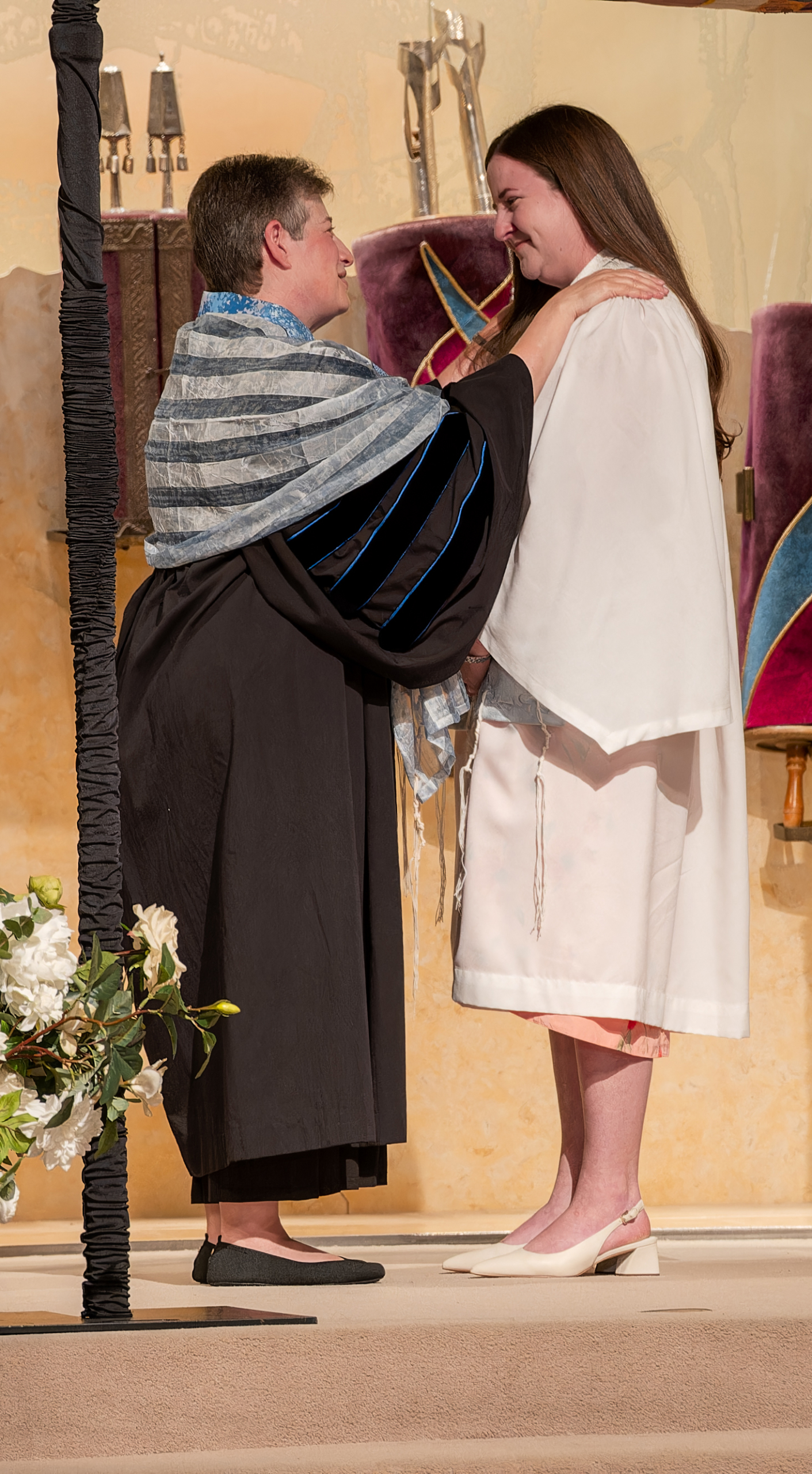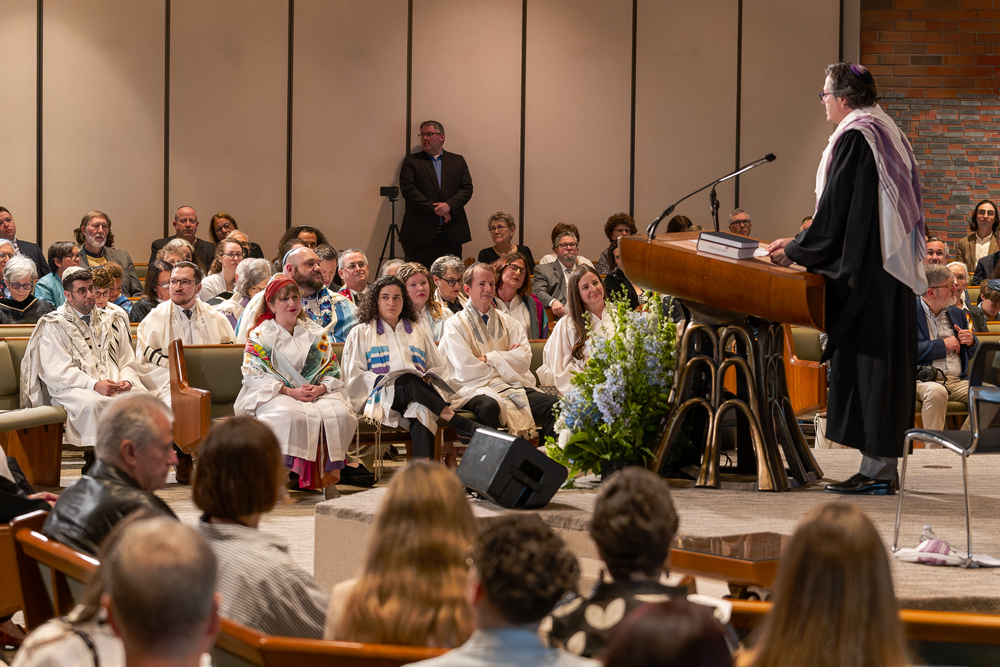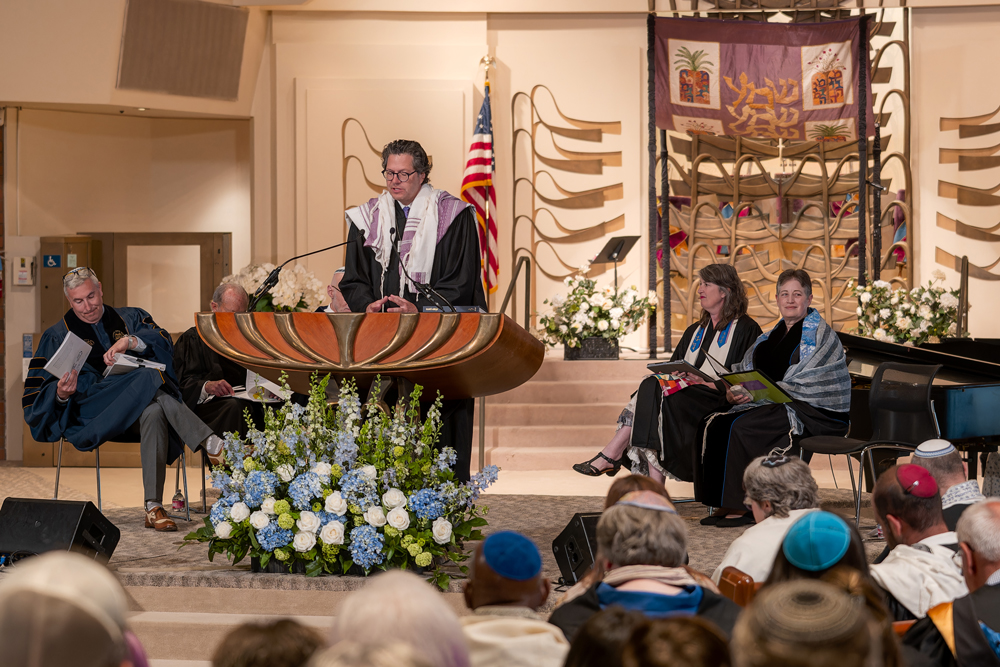 On Sunday, May 18 Stephen Wise Temple was honored to host the ordination ceremony of the Hebrew Union College. We welcomed and witnessed nine new Rabbis being minted! Our intern, Yael Farber, celebrated her ordination and we are proud to be able to now call her Rabbi Farber. In addition, Rabbi Yoshi was invited to address the ordinands at the beginning of the ceremony. Below are his words which are in part a reflection on rabbinic leadership more broadly and the needs confronting synagogues and Jewish communities today.
On Sunday, May 18 Stephen Wise Temple was honored to host the ordination ceremony of the Hebrew Union College. We welcomed and witnessed nine new Rabbis being minted! Our intern, Yael Farber, celebrated her ordination and we are proud to be able to now call her Rabbi Farber. In addition, Rabbi Yoshi was invited to address the ordinands at the beginning of the ceremony. Below are his words which are in part a reflection on rabbinic leadership more broadly and the needs confronting synagogues and Jewish communities today.
Standing at Horev – Feet Planted On the Cracked Soil
יְהֹוָ֣ה אֱלֹהֵ֗ינוּ כָּרַ֥ת עִמָּ֛נוּ בְּרִ֖ית בְּחֹרֵֽב׃
לֹ֣א אֶת־אֲבֹתֵ֔ינוּ כָּרַ֥ת יְהֹוָ֖ה אֶת־הַבְּרִ֣ית הַזֹּ֑את
כִּ֣י אִתָּ֔נוּ אֲנַ֨חְנוּ אֵ֥לֶּה פֹ֛ה הַיּ֖וֹם כֻּלָּ֥נוּ חַיִּֽים׃
פָּנִ֣ים ׀ בְּפָנִ֗ים דִּבֶּ֨ר יְהֹוָ֧ה עִמָּכֶ֛ם בָּהָ֖ר מִתּ֥וֹךְ הָאֵֽשׁ׃
Our God made a covenant with us at Horev—not with our ancestors, but with us, the living, every one of us here today. Face to face, God spoke to you on the mountain, from the midst of the fire. (Deut. 5:2-4)
Sinai and all it connotes, but also, importantly
Horev—its other name.
The one less often mentioned–you don’t hear people talking about “Horev moments” very often, do you?
Horev – the place that means “dryness,” “wasteland,” “desolation.” Related to the word churban. Related to the word cherev.
It’s a place so dry you can feel the cracked earth under your feet.
A place so empty it echoes.
 It’s THE MOST IMPORTANT mountain in our entire tradition, our Everest, yet with no confirmed location and, interestingly according to the midrash, unremarkable.
It’s THE MOST IMPORTANT mountain in our entire tradition, our Everest, yet with no confirmed location and, interestingly according to the midrash, unremarkable.
It’s the place where our very purpose was defined. The place we are approaching in this season of counting up to Shavuot.
And our Torah insists:
It wasn’t with your ancestors alone. It was with you. You who are alive today. אֵ֥לֶּה פֹ֛ה הַיּ֖וֹם כֻּלָּ֥נוּ חַיִּֽים׃
That’s the urgent theology of this moment.
Revelation is not some ancient relic. It is ALIVE—now, here, in you.
You, dear students today become our teachers, our rabbis. You stand – today – at Sinai and at Horev, too.
The fire still burns.
And sometimes–let’s be real–sometimes the earth is cracked beneath our feet. The ground is dry. We experience moments of desolation and destruction. And our job is to find the words that can bring inspiration and meaning. To find the path to silence, too, when that is what is required.
To have the patience to wander a bit in the wilderness and the faith to know that somehow, someway, we will make it at long last to the land of promise.
Horev – sometimes, much of the time even, we are in the wilderness. But as Rabbi Danya Ruttenberg writes:
“The wilderness is not a punishment. It is a place of possibility. It is where transformation happens.”
That is your task:
To walk into wastelands with open hearts and open arms.
To kindle hope in places where the air still tastes of smoke.
To listen for God—not always in the thunder—but in the stillness that follows as well.
The fire of Horev is not just in the text, in the intellectual exercise of the Beit Midrash.
The fire is where babies cry and elders grieve.
It’s where bride and groom rejoice.
It’s at the vidui (confessional) in the ICU with family standing around the bedside of a beloved mother.
The fire of Horev is in the conversation with the grieving widow who says: I’m not sure I believe anymore.
It’s in the answer which you articulate in your presence, in your truth, in your willingness to stand in the fire.
The fires of Horev burn fiercely. The dryness. The desolation.
We feel it keenly today as we hold in our hearts the 58 hostages still held in Gaza.
As we carry the sorrow of Israeli and Palestinian families—torn, terrified, waiting–exhausted.
This covenant is made sometimes in heartbreak.
This belief, this insistence that God still speaks, God is still there. פָּנִ֣ים ׀ בְּפָנִ֗ים–Face to face. From the fire.
So this is your charge:
 When others flee the mountain, you walk toward it.
When others flee the mountain, you walk toward it.
When others fear the fire, you listen from within it.
When others long for certainty, you offer covenant—that sacred promise to stay, to care, to lead, and to love.
When others turn away from the mountain, you take a step closer. To listen. To learn. To help. To heal.
When the fire frightens and scatters, you remain calm, still, listening for the voice within the flames.
When the world aches for easy answers, you offer something deeper—a dialogue, a conversation, a covenant.
Not certainty, but presence.
Not escape, but enduring love.
A promise to lead with humility, to stay when it’s hard, to hold others close when they feel far from God.
You will teach Torah—but more than that, you will embody it.
You will bless those you serve—but more than that, you will be a blessing.
You will stand not above your people, but among them.
Feet firmly planted on the cracked soil, in the place of possibility, where transformation happens.
Horev is not behind us.
It is here.
And God is not done speaking.
And you are not done saying: Hineni.
Mazal tov, rabbis. You are here. You are alive. The covenant is yours. And the world awaits your fire.
